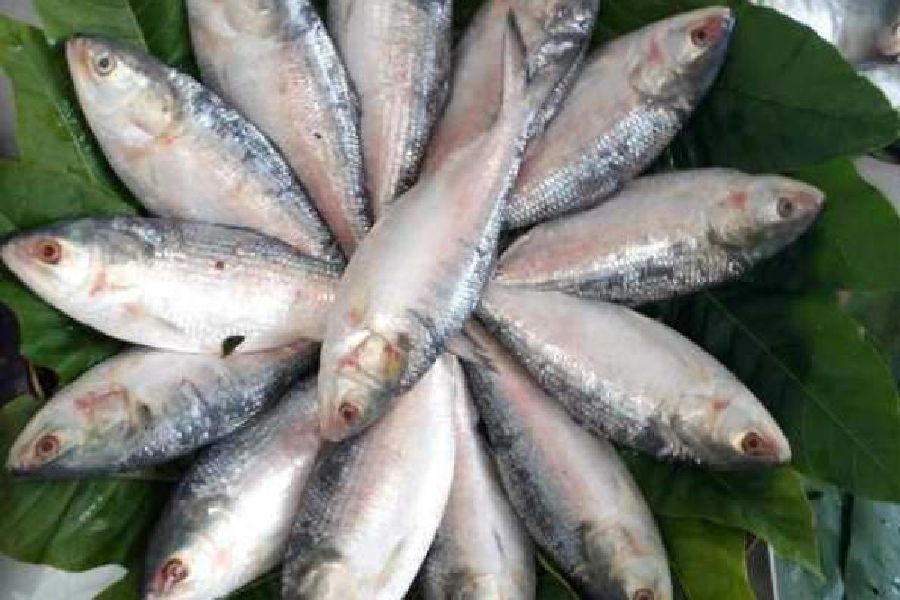Bengal will not be denied its plate of Padmar ilish this Puja season, after all.
The interim government in Bangladesh has decided to export 3,000 tonnes of ilish (hilsa) to Bengal “on the occasion of the upcoming Durga Puja”, junking its earlier decision not to send across the border one of the state’s most loved varieties of fish.
The Bangladesh commerce ministry released a notification on Saturday seeking applications by September 24 noon from traders who wish to export ilish to Bengal.
Signed by Sultana Akhtar of the commerce ministry, the notification refers to permission to export 3,000 tonnes of ilish.
“The export approval is based on appeals made by Indian exporters, subject to certain conditions,” it says.
Copies of the notification have been sent to the Bangladesh high commissioner’s office in New Delhi and the deputy high commissioner’s office in Calcutta.
“The notification doesn’t mention a timetable for the export... we believe there will be a separate one outlining the timeframe,” said Syed Anwar Maqsood, secretary of the Fish Importer’s Association (FIA) in Calcutta.
“But it has in principle been decided that Bengal will receive ilish from Bangladesh this festive season, and that’s reason enough to celebrate.”
Last year, the Bangladesh commerce ministry had allowed 79 fish exporters to send 3,950 tonnes of ilish to India as a Durga Puja gesture. Importers said only 1,300 tonnes eventually reached the state. In 2022, the same volume of ilish had arrived in Bengal from Bangladesh.
Fish importers in Calcutta and Howrah said they had been importing ilish from Bangladesh since 1996.
Earlier this month, the interim government in Bangladesh had decided to stop ilish export to India, ostensibly to meet the domestic demand and control domestic prices. That decision threatened to end a tradition nurtured by ousted Prime Minister Sheikh Hasina.
Within days of the decision, ilish importers from Bengal wrote to Touhid Hossain, an adviser to the Bangladesh government, seeking a rethink.
“...We seek your kind intervention and request you to please allow export of hilsa fish for Durga Puja. It may be worthy to note that the hilsa from Bangladesh is in great demand amongst connoisseurs of fish in West Bengal, Assam and Tripura,” the letter, signed by Maqsood, said.
Kartick Chakraborty, secretary of the Petrapole Clearing Agents Staff Welfare Association, said: “There were concerns about India-Bangladesh relations souring after Sheikh Hasina’s exit, but this move will help rebuild trust.”
The impending arrival of ilish from Bangladesh has sparked hopes of a drop in prices. Currently, Padma ilish weighing over 1kg, brought in through unofficial channels, is selling for around ₹2,000 a kg.
“We expect prices to fall once the first consignment arrives, hopefully by next week,” an FIA member said.
Sources in Bangladesh suggested the export ban was motivated partly by the surge in anti-India sentiments in the country following the fall of Hasina. So, what led to the change of heart?
“It’s become clear to the interim government that bowing to the anti-India sentiments among a large section of the Bangladeshi people would not eventually benefit the country,” a Bangladeshi exporter said.
“India’s decision to continue onion exports to Bangladesh, despite a global shortage, may have influenced this decision, too. India supplies up to 800,000 tonnes of onions to Bangladesh annually, and the interim government probably didn’t want to jeopardise this relationship.”
On Saturday, ilish lovers in Calcutta were rejoicing.
“The news is an absolute delight for an ilish lover like me. They say that a Bengali can forget everything but not the taste of ilish maachher jhol,” said restaurateur Anjan Chatterjee.










